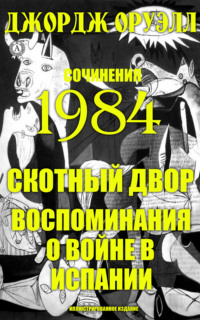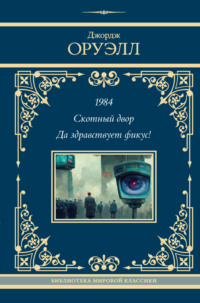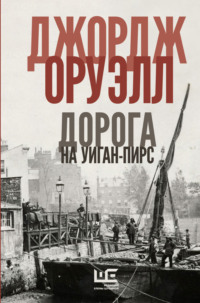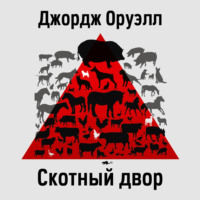
Полная версия
1984. Адаптированная книга для чтения на английском языке. Уровень B1
Chapter 5
The canteen with its low ceiling was full and it was very noisy. People were waiting in line for their meal and Victory Gin.
«There you are», said a voice at Winston's back.
He turned round. It was his friend Syme, who worked in the Research Department. Perhaps «friend» was not the right word. You did not have friends anymore, you had comrades: but there were some comrades who you liked more than others. Syme was a specialist in Newspeak. He was now working on the Eleventh Edition of the Newspeak Dictionary. He was smaller than Winston, with dark hair and large eyes. It seemed that his eyes searched your face, when he spoke to you.
«Have you got any razor blades?» he asked.
«Not one!» said Winston quickly. «I've tried everywhere. They don't exist any longer».
Everyone kept asking you for razor blades. Actually he had two unused ones which he was keeping for himself. There were no razor blades anywhere for months past. There was always something that you couldn't find in the Party shops. Sometimes it was buttons, sometimes it was shoelaces; right now it was razor blades. You could only get them, if at all, by asking for them more or less secretly on the «free» market.
«I've been using the same blade for six weeks», he lied.
The queue moved forward. As they stopped he turned to Syme again. Each of them took a dirty metal tray from the counter.
«Did you go and see the prisoners hanged yesterday?» said Syme.
«I was working», said Winston. «I shall see the film, I suppose».
«It's not the same at all», said Syme.
His eyes searched Winston's face. «I know you», the eyes seemed to say, «I know very well why you didn't go». Syme was very orthodox. It was very interesting to talk to him about Newspeak, but you first had to get him away from such subjects as helicopter raids on enemy villages, and trials of thoughtcriminals. Winston turned his head a little aside to avoid the large dark eyes.
«It was a good hanging», said Syme. «I don't like it when they tie their feet together. I like to see them kicking. And above all, at the end, the bright blue tongue. That's the detail that I like».
«Nex', please!» yelled the prole behind the counter.
Winston and Syme each got their lunch – pinkish-grey stew, a large piece of bread, a cube of cheese, a mug of Victory Coffee without milk, and one saccharine tablet.
«There's a table over there, under that telescreen», said Syme. «Let's get a gin on the way».
The gin was served in china mugs with no handles. They went across the crowded room to one of the tables and put their trays on it. On one corner of the table, there was stew. It looked like vomit. Winston took up his mug of gin, paused for a moment, and drank all at once. He suddenly discovered that he was hungry. Winston and Syme didn't speak again until they finished their stew. The pinkish cubes in it were probably meat. From the table at Winston's left, a little behind his back, someone was talking and in the general noise of the room it sounded like the quacking of a duck.
«How is the Dictionary getting on?» said Winston loudly so that Syme could hear him.
«Slowly», said Syme. Winston could see he was happy to talk about Newspeak. «I'm on the adjectives».
Syme took up his bread in one hand and his cheese in the other, and leaned across the table so that he could speak without shouting.
«We're getting the language into its final shape», he said, «the shape it's going to have when nobody speaks anything else. When we've finished with it, people like you will have to learn it all over again. We do not invent new words. We're destroying words – hundreds of them, every day. The Eleventh Edition won't contain any words that will be out of use before the year 2050».
He bit into his bread and continued speaking passionately. His thin dark face had become happy; his eyes weren't searching Winston's face anymore.
«It's a beautiful thing, the destruction of words. We get rid mostly of the verbs and adjectives, but there are hundreds of nouns that can be destroyed as well. It isn't only the synonyms; there are also the antonyms. After all, why do you need a word which is simply the opposite of some other word? Take ‘good', for example. If you have a word like ‘good', what need is there for a word like ‘bad'? ‘Ungood' is better, because it's an exact opposite, and ‘bad' is not. Or again, if you want a stronger version of ‘good', you just have to say ‘plusgood' or ‘doubleplusgood' if you want something stronger still. Of course we use those words already. But in the final version of Newspeak there'll be nothing else. There will only be six words to express goodness and badness – in reality, only one word. Don't you see the beauty of that, Winston? It was B. B.'s idea, of course», he added.
Syme saw that Winston was not really interested.
«You don't understand the importance of Newspeak, Winston», he said almost sadly. «Even when you write it you're still thinking in Oldspeak. I've read some of those pieces that you write in the Times from time to time. They're good enough, but they're translations. In your heart you prefer Oldspeak. You don't see the beauty of the destruction of words. Do you know that Newspeak is the only language in the world whose vocabulary gets smaller every year?»
Winston did know that, of course. He smiled, but didn't speak. Syme bit off another piece of the dark-coloured bread, and went on:
«Don't you see that thoughtcrime will be impossible in the end because of Newspeak? There will be no words in which to express it. It narrows the range of thought. Every word will only have one meaning. Already, in the Eleventh Edition, we're not far from it. But the process will still be continuing long after you and I are dead. Every year fewer and fewer words, and less and less thoughtcrime. Even now, of course, there's no reason or excuse for thoughtcrime. It's just a question of self-discipline, reality-control. But in the end there won't be any need even for that. The Revolution will be complete when the language is perfect. Newspeak is Ingsoc and Ingsoc is Newspeak», he added. «Can you imagine, Winston, that by the year 2050, at the very latest, there won't be a single human who could understand our conversation?»
«Except…» began Winston in doubt, and he stopped.
He almost said, «Except the proles», but he wasn't sure that this was not unorthodox. Syme, however, had guessed what he wanted to say.
«The proles are not humans», he said. «By 2050 – earlier, probably – all real knowledge of Oldspeak will have disappeared. There will be no literature of the past. Chaucer, Shakespeare, Milton, Byron – they'll exist only in Newspeak versions. But they will be changed into something quite opposite. Even the literature of the Party will change. Even the slogans will change. How could you have a slogan like ‘freedom is slavery' when there's no idea of freedom? The whole climate of thought will be different. In fact there will be no thought, as we understand it now. Orthodoxy means not thinking – not needing to think».
One of these days, thought Winston, Syme will be vapourized. He is too intelligent. He sees too clearly and speaks too openly. The Party does not like such people. One day he will disappear. It is written in his face.
Winston had finished his bread and cheese. He turned a little to the side in his chair to drink his mug of coffee. At the table on his left the man was still talking. A young woman was sitting at the same table with her back to Winston and listening to the man. She was perhaps his secretary and seemed to agree with everything that he was saying. From time to time she said «I think you're so right, I do so agree with you». But the other voice never stopped, even when the girl was speaking. Winston had seen the man before. He was a man of about thirty. Winston knew that he held some important post in the Fiction Department, but nothing else. Winston couldn't hear what the man was talking about, he just once caught a phrase – «they should finally destroy Goldsteinism». For the rest it was just a noise, a quack-quack-quacking. And yet, you knew what he was talking about. You could be certain that every word of it was pure orthodoxy, pure Ingsoc. It was not the man's brain that was speaking, it was his throat. What he was saying consisted of words, but it was not speech in the true sense: it was a noise, like the quacking of a duck.
Syme was silent. The voice from the other table quacked, Winston and Syme could hear it in spite of the noise.
«There is a word in Newspeak», said Syme, «I don't know whether you know it: duckspeak, to quack like a duck. It is one of those interesting words that have two opposite meanings. If you say it to your opponent, it is negative, if you say it to someone you agree with, it is positive».
There's no doubt that Syme will be vapourized, Winston thought again. He thought it with a kind of sadness. He knew well that Syme disliked him, and could report him as a thoughtcriminal if he saw any reason for it. There was something wrong with Syme. There was something that he lacked: a sort of saving stupidity. You could not say that he was unorthodox. He believed in the principles of Ingsoc, he respected Big Brother, he hated thought-criminals. Yet there was something wrong with him. He said things that you shouldn't say, he had read too many books, he often went to the Chestnut Tree Café, where painters and musicians went. There was no law against going to the Chestnut Tree Café, yet you knew that you shouldn't. The old leaders of the Party had been used to go there before they were destroyed. Goldstein himself, it was said, had sometimes been seen there, years ago. Winston knew what would happen to Syme. And yet if Syme learnt Winston's secret opinions, he would report him to the Thought Police at once. So would anybody else: but Syme more than most.
Syme looked up. «Here comes Parsons», he said.
Something in the tone of his voice seemed to add, «that fool». Parsons, who lived in the same block of Victory Mansions as Winston, was in fact coming across the room. At thirty-five he was already getting fat at neck and waist. His movements and his whole appearance was that of a little boy grown large. He greeted them both with a happy «Hullo, hullo!» and sat down at the table. Winston and Syme felt a strong smell of sweat. He always sweated a lot. At the Community Centre you could always tell when he had been playing table-tennis, because the bat handle was wet. Syme had taken a strip of paper with a long list of words, and was studying it with an ink-pencil between his fingers.
«Look at him working away in the lunch hour», said Parsons, pushing Winston with his elbow. «What's that you've got there, old boy? Something a bit too clever for me, I expect. Smith, old boy, I'll tell you why I'm here. It's that sub you forgot to give me».
«Which sub is that?» said Winston, looking for money. About a quarter of one's salary had to be given for voluntary subscriptions. There were so many that it was difficult to remember all of them.
«For Hate Week. I'm in charge of our block. We're going to put on a great show. I tell you, it won't be my fault if old Victory Mansions doesn't have the biggest number of flags in the whole street. Two dollars you promised me».
Winston found and gave him two notes, which Parsons put in a small notebook.
«By the way, old boy», he said. «I hear that my little boy hit you with his catapult yesterday. I told him I'd take the catapult away if he does it again».
«I think he was a little upset at not going to the hanging», said Winston.
«Ah, well – troublemakers they are, both of them! All they think about is the Spies, and the war, of course. Do you know what that little girl of mine did last Saturday on a hike? She made two other girls to go with her and spent the whole afternoon following a strange man. They followed him for two hours, right through the woods, and then reported him to the patrols».
«What did they do that for?» said Winston, surprised. Parsons continued:
«My kid made sure he was some kind of enemy spy – might have used a parachute, for instance. But here's the point, old boy. Why do you think she followed? She saw that he was wearing a funny kind of shoes – said she'd never seen anyone wearing shoes like that before. So the chances were he was a foreigner. Pretty smart for a child of seven, eh?»
«What happened to the man?» said Winston.
«Ah, I don't know, of course. But I guess…» Parsons made the motion of aiming a rifle, and clicked his tongue for the explosion.
«Good», said Syme without looking up from his strip of paper.
«Of course we can't risk», agreed Winston.
«What I mean to say, there is a war on», said Parsons.
At this very moment they heard a trumpet call from the telescreen just above their heads. However, it was not news of a military victory this time, but a message from the Ministry of Plenty.
«Comrades!» cried a youthful voice. «Attention, comrades! We have great news for you. We have won the battle for production! The standard of living has risen by 20 percent over the past year. All over Oceania this morning there were demonstrations when workers came out of factories and offices and went through the streets with banners to express their gratitude to Big Brother for our new, happy life. Here are some of the figures…»
The voice repeated the phrase «our new, happy life» several times. The Ministry of Plenty had been using it quite a lot lately. Parsons was listening to the message. He didn't understand the figures, but he knew that they were in some way a reason to be happy. He had taken out a big dirty pipe which was already half full of tobacco. You couldn't fill a pipe to the top with the tobacco ration at 100 grammes a week. Winston was smoking a Victory Cigarette which he held carefully. The new ration did not start till tomorrow and he had only four cigarettes left. For the moment he ignored the noises in the canteen and was listening to the message from the telescreen. There had even been demonstrations to thank Big Brother, because he had raised the chocolate ration to twenty grammes a week. And only yesterday, he thought, it had been announced that the ration would be reduced to twenty grammes a week. Was it possible that they could believe that, after only twenty-four hours? Yes, they believed it. Parsons believed it easily, as stupid as an animal. The man at the other table believed it, he would vapourize anyone who should say that last week the ration had been thirty grammes. Syme, too – in some more complex way, involving doublethink, Syme believed it. Was he, then, the only one who had a memory?
The report from the telescreen continued. This year there was more food, more clothes, more houses, more ships, more helicopters, more books, more babies – more of everything except disease, crime, and insanity. Year by year and minute by minute, everybody and everything was becoming better. Had it always been like this? Had food always tasted like this? He looked round the canteen. The low ceiling, with a lot of people in it, its walls dirty; metal tables and chairs, placed so close together that you sat with elbows touching; bent spoons, dirty trays; and a strong smell of bad gin and bad coffee and stew and dirty clothes. You always had a feeling in your stomach and in your skin that there was something that you had a right to, but didn't get. He couldn't remember anything greatly different. In any time, there had never been quite enough to eat, one had never had socks or underclothes without holes, bread had always been dark-coloured, coffee bad, cigarettes too few – you could only get enough cheap gin. And, of course, it grew worse when you became older. Was it not a sign that this was wrong? Why should one feel one couldn't bear it? Didn't it mean one had some kind of memory that things had once been different?
He looked round the canteen again. Nearly everyone was ugly, and would still have been ugly even if dressed otherwise than in the blue uniform. On the far side of the room, sitting at a table alone, a small man was drinking a cup of coffee, looking from side to side with his little eyes. It was easy to think there were people of the ideal physical type set by the Party – tall muscular youths, blond-haired, sunburnt, careless – that there were a lot of them, ifyou didn't look around, thought Winston. Actually most of the people in Airstrip One were small and dark. There were many men like this in the Ministries: little men, growing fat very early in life, with short legs, and fat faces with very small eyes.
The message from the Ministry of Plenty ended on another trumpet call and gave way to some low quality music. Parsons took his pipe out of his mouth.
«The Ministry of Plenty's done a good job this year», he said. «By the way, Smith old boy, I suppose you haven't got any razor blades?»
«Not one», said Winston. «I've been using the same blade for six weeks myself».
«Ah, well – just thought I'd ask you, old boy».
«Sorry», said Winston.
The quacking voice from the next table had started up again, as loud as ever. Winston suddenly thought of Mrs. Parsons. Within two years those children would be reporting her to the Thought Police. Mrs. Parsons would be vapourized. Syme would be vapourized. Winston would be vapourized. O'Brien would be vapourized. Parsons, on the other hand, would never be vapourized. The man with the quacking voice would never be vapourized. The little men from the Ministries, too, would never be vapourized. And the girl with dark hair, the girl from the Fiction Department – she would never be vapourized either. It seemed to him that he knew who would survive and who would die: though it was not easy to say why.
At this moment the girl at the next table turned partly round and was looking at him. It was the girl with dark hair. When she caught his eye she looked away again.
Winston felt scared. Why was she watching him? Why was she following him about? Unfortunately he could not remember whether she had already been at the table when he arrived, or had come there afterwards. But yesterday, at any rate, during the Two Minutes Hate, she had sat right behind him when there was no need to do so. Quite likely she had wanted to listen to him and make sure whether he was shouting loudly enough.
His earlier thought returned to him: probably she was not actually a member of the Thought Police, but it made her even more dangerous. He did not know how long she had been looking at him, but perhaps for as much as five minutes. It was possible that his face had not been perfectly under control. The smallest thing could give you away. To wear a wrong expression on your face (to look as if you don't believe it when there was a message of a victory, for example) was itself an offence. There was even a word for it in Newspeak: facecrime, it was called.
The girl had turned her back on him again. Perhaps after all she was not really following him about, perhaps it didn't mean anything that she had sat so close to him yesterday and was looking at him now. His cigarette had gone out, and he laid it carefully on the table. He would finish smoking it after work, if he could keep the tobacco in it. Syme had folded up his strip of paper and put it away in his pocket. Parsons had begun talking again.
«Did I ever tell you, old boy», he said, «about the time when those two kids of mine set fire to the old market-woman's skirt because they saw her wrapping up sausages in a poster of B. B.? Burned her quite badly, I believe. Troublemakers, eh? That's a good training they give them in the Spies now – better than in my day, even. They've given them ear trumpets for listening through keyholes! My little girl brought one home the other night – tried it on our sitting-room door, and said she could hear twice as much as with her ear to the hole. Of course it's only a toy. Still, gives them the right idea, eh?»
At this moment the telescreen let out a whistle. It was the signal to return to work. All three men jumped to their feet and went to the lifts, and the tobacco fell out of Winston's cigarette.
Конец ознакомительного фрагмента.
Текст предоставлен ООО «ЛитРес».
Прочитайте эту книгу целиком, купив полную легальную версию на ЛитРес.
Безопасно оплатить книгу можно банковской картой Visa, MasterCard, Maestro, со счета мобильного телефона, с платежного терминала, в салоне МТС или Связной, через PayPal, WebMoney, Яндекс.Деньги, QIWI Кошелек, бонусными картами или другим удобным Вам способом.
Примечания
1
Час дня, 13:00 (обозначение времени, принятое в армии; так называемое «военное время», Military Time).
2
Колчестер – город и одноимённый район в графстве Эссекс на юго-востоке Англии, на реке Колн.
3
Карл I Великий – франкский король в 768–814 гг. (император с 800 г.) из династии Каролингов (751–987). Основал огромную империю в Западной Европе, в которую входили Северная Испания, Франция, Германия, Северная и Центральная Италия.
4
Гай Юлий Цезарь.









